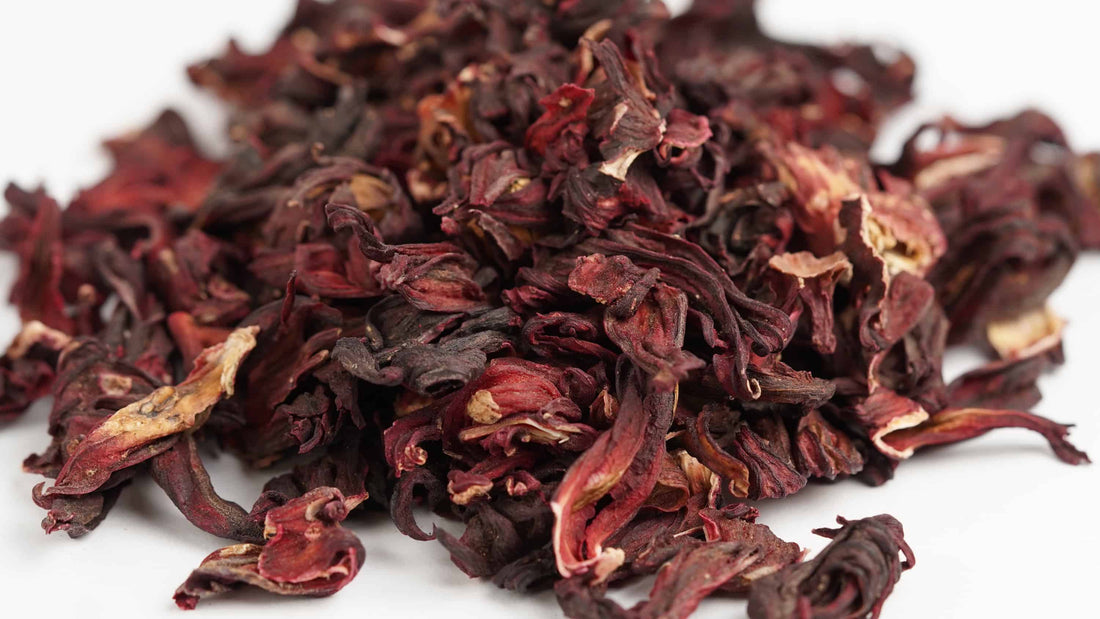If you're a fan of herbal brews that feel as good as they taste, hibiscus tea might just be your new go-to. With its vivid ruby hue, tart cranberry-like flavour, and health-supporting properties, it’s a joy to sip hot or cold – especially in summer. Here’s why we love it.
What is Hibiscus Tea?
Hibiscus tea is made from the dried petals (technically, the calyces) of the Hibiscus sabdariffa flower. It’s naturally caffeine-free, deeply coloured, and boasts a sharp, tangy taste. Depending on where you are in the world, you might know it as karkadé, roselle, or agua de Jamaica – but its appeal is universal.
Why Drink It? Scientifically Backed Benefits of Hibiscus Tea
This study suggests hibiscus may have some of the following benefits, although further studies are needed in order to ascertain the bioavailability of some compounds:
- Antioxidant-rich: Packed with anthocyanins and phenolic compounds that help neutralise free radicals and reduce oxidative stress.
- Supports healthy blood pressure: Multiple clinical trials show hibiscus may lower systolic and diastolic blood pressure in people with mild hypertension.
- Heart-friendly lipids: May help reduce LDL ("bad") cholesterol and triglycerides, while modestly increasing HDL ("good") cholesterol.
- Anti-inflammatory effects: Compounds like hibiscetin help inhibit inflammation-related enzymes, which may benefit chronic conditions.
- Antimicrobial activity: Lab studies show hibiscus extracts may fight bacteria like E. coli and Staphylococcus aureus.
- Supports blood sugar balance: Shown to improve insulin sensitivity and glucose metabolism, particularly in people with metabolic syndrome.
- Liver protective: Animal studies suggest it may reduce liver fat and help regulate enzymes in high-fat diets.
- May aid weight management: Some evidence points to reduced fat accumulation and improved metabolic markers in animals.
Perfect Hot or Iced
One of hibiscus tea’s best features? It’s wonderfully adaptable. Serve it warm in the evening as a calming ritual or ice it for the ultimate summer cooler.
To enjoy it hot: Steep 1 teaspoon of dried hibiscus in freshly boiled water for 5–7 minutes. Add honey or a twist of lemon if you like.
To enjoy it cold: Prepare it just like hot tea, let it cool and then refrigerate. Alternatively, add 2–3 tablespoons of hibiscus to a litre of cold water and refrigerate overnight. Strain in the morning, then serve over ice with mint, lime, or cucumber slices.
When to Be Cautious
Hibiscus is generally safe for most people in moderate amounts, but it’s wise to keep a few things in mind, according to the same study referenced above:
- Low blood pressure: It can lower blood pressure further, so it’s not ideal for anyone with hypotension or taking antihypertensive medications.
- Drug interactions: May interact with medications including diuretics, blood pressure drugs, diabetes treatments, and acetaminophen. Speak to your GP if unsure.
- Fertility concerns in high doses: Animal studies showed hormonal changes and reduced sperm count with concentrated hibiscus extract. Not yet confirmed in humans, but worth noting.
- Possible liver impact in large amounts: While protective in small doses, high doses in lab animals have altered liver enzyme levels.
- Not recommended in pregnancy: Some studies indicate uterine and hormonal effects; best avoided during pregnancy or when trying to conceive.
- Rare side effects: Some people may experience bloating, nausea, or skin reactions—especially if consumed in high amounts.
If in doubt, it's always besto to check with your GP or pharmacist.
How Much is Too Much?
Like all herbal teas, moderation is key. Two to three cups a day is generally considered safe for most people. Stronger brews or excessive daily intake may lead to dizziness or impact liver enzymes – so stick with sensible amounts and see how your body responds.
Final Thoughts
Whether you’re looking to switch up your herbal tea routine or want a naturally refreshing drink for summer, hibiscus tea is a vibrant choice. Its sharp, floral taste and potential health perks make it a staple worth exploring – just remember to consult your GP if you have any health concerns or take prescription medications.
Feeling inspired? Try brewing it with cinnamon, fresh ginger, or even sparkling water for a homemade iced tea that looks as good as it tastes.
Fancy trying hibiscus yourself? Shop our whole-petal Hibiscus tea here.

